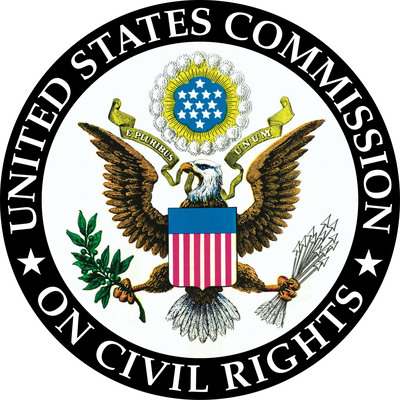U.S. Commission on Civil Rights Releases Report: The Civil Rights Implications of the Federal Use of Facial Recognition Technology
PR Newswire
WASHINGTON, Sept. 19, 2024
WASHINGTON, Sept. 19, 2024 /PRNewswire/ -- Today, the U.S. Commission on Civil Rights (Commission) released the report The Civil Rights Implications of the Federal Use of Facial Recognition Technology, which examines concerns about the federal government's use of Facial Recognition Technology (FRT) and recommendations for regulations and best practices.
Meaningful federal guidelines and oversight for responsible FRT use have lagged behind the application of this technology in real-world scenarios. With the advent of biometric technology and its widespread use by both private and government entities, the Commission studied how the Department of Justice (DOJ), Department of Homeland Security (DHS), and Department of Housing and Urban Development (HUD) are utilizing this technology, in compliance with existing civil rights laws. Currently, there are no laws that expressly regulate the use of FRT or other AI by the federal government, and no constitutional provisions governing its use.
Concerns raised during the Commission's briefing on the use of FRT included:
- Algorithmic accuracy rates can vary widely among developers, and across race and gender, and can result in false positive and false negative matches. Fluctuating accuracy rates can lead to discriminatory practices and potentially violate an individual's civil rights.
- The technology's relatively easy development and ability for inexperienced and inadequately trained operators to wield makes its use easy to expand without fully understanding its capabilities and risks.
- The absence of standards for FRT use pervades the entire pipeline-from the designers and developers of the core technology to federal government policies, training, transparency, and oversight.
The Commission found during its research process that within DOJ, FRT is primarily utilized by the Federal Bureau of Investigations (FBI) and the U.S. Marshals Service (USMS), most often to generate leads in criminal investigations and during efforts to locate known subjects. The Department of Homeland Security uses biometrics (such as fingerprints, iris, and face recognition) to help enable operational missions, both to support national security and public safety and to deliver benefits and services with greater efficiency and accuracy. The Commission also found that through HUD, FRT is integrated into surveillance cameras used in federally-funded public housing through the Emergency Safety and Security grant program.
"Unregulated use of facial recognition technology poses significant risks to civil rights, especially for marginalized groups who have historically borne the brunt of discriminatory practices," said Rochelle Garza, Chair of the U.S. Commission on Civil Rights. "As we work to develop AI policies, we must ensure that facial recognition technology is rigorously tested for fairness, and that any detected disparities across demographic groups are promptly addressed or suspend its use until the disparity has been addressed."
"With the publication of this groundbreaking report, including its findings and recommendations, the U.S. Commission on Civil Rights brings a crucial civil rights perspective to the nation's discussion of responsible federal use of facial recognition technology. This report addresses concerns about accuracy, oversight, transparency, discrimination, and access to justice. We are excited at the opportunity to provide guidance for the United States Government to meet this moment of immense technological potential with due consideration and protections for the civil rights of all Americans," said Commissioner Mondaire Jones.
"It is my hope that this bipartisan report will help inform public policy that will address the myriad of issues concerning artificial intelligence (AI) in general, but as it relates to this issue, facial recognition technology specifically. Our country has a moral and legal obligation to ensure that the civil rights and civil liberties of all Americans are protected," said Commissioner Gilchrist.
To learn more about the federal use of FRT and its civil rights implications, visit https://www.usccr.gov/reports/2024/civil-rights-implications-federal-use-facial-recognition-technology.
The U.S. Commission on Civil Rights is the only independent, bipartisan agency charged with advising the President and Congress on civil rights and reporting annually on federal civil rights enforcement. Our 56 state and territory Advisory Committees offer a broad perspective on civil rights concerns at state and local levels. The Commission: In our 7th decade, a continuing legacy of influence in civil rights. For more information about the Commission, please visit www.usccr.gov and follow us on Twitter and Facebook.
Contact: Joe Kim
publicaffairs@usccr.gov
202-499-0263
![]() View original content to download multimedia:https://www.prnewswire.com/news-releases/us-commission-on-civil-rights-releases-report-the-civil-rights-implications-of-the-federal-use-of-facial-recognition-technology-302253434.html
View original content to download multimedia:https://www.prnewswire.com/news-releases/us-commission-on-civil-rights-releases-report-the-civil-rights-implications-of-the-federal-use-of-facial-recognition-technology-302253434.html
SOURCE U.S. Commission on Civil Rights



